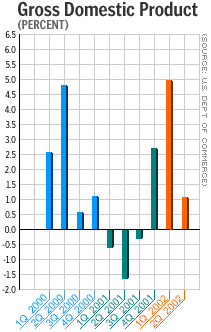NEW YORK (CNN/Money) -
Although last week's revision of U.S. gross domestic product data for 2001 may have been old news for the economy, it was something of a stroke of luck for President Bush, who has since used it as evidence that he inherited an economic mess when he took office.
Bush and Vice President Dick Cheney, in separate speeches Wednesday, both claimed the U.S. economy was already in recession when they were inaugurated in January 2001, implying the blame for the slowdown rested on President Clinton's shoulders.
Both men also made assurances that they had a handle on the problems facing the economy.

"When I took office, our economy was beginning a recession," Bush said in a speech at a Mississippi high school. "Then our economy was hit by terrorists. Then our economy was hit by corporate scandals. But I'm certain of this: We won't let fear undermine our economy and we're not going to let fraud undermine it either."
In a congressional election year, the administration seems determined to avoid the apparent mistakes of the first President Bush, who lost a bid for a second term after the Clinton campaign took advantage of the perception that Bush was not paying close enough attention to the economy.
The current Bush administration's claim that it inherited a recession from Clinton became somewhat more credible last week, when the Commerce Department revised its estimates of GDP, the broadest measure of economic growth, in the first, second and third quarters of 2001, showing that it shrank in all three quarters.
Earlier estimates found economic activity contracted in only the third quarter of 2001, due mostly to a dramatic, temporary slowdown in activity after the Sept. 11 terror attacks.
Since one popular rule-of-thumb definition of a recession is two or more consecutive quarters of shrinking GDP, it became possible, based on the revised data, to say a recession began in January 2001.
It was also easier for Bush and Cheney to point to the two quarters of growth so far in 2002 and claim that the tax cuts and economic stimulus packages they pushed in 2001 had helped the economy recover.
"Rebate checks, a rate reduction on tax day and a stimulus package helped turn three quarters of decline into two quarters of growth," Cheney said in a speech to the Commonwealth Club of California.
Bush, meanwhile, also called on Congress to make the tax cuts -- which expire 10 years from now -- permanent. "For the sake of our economic vitality, allowing people to plan, for the sake of small businesses across the country, we need to make tax reduction permanent," Bush said.
But it's not entirely clear when the recession actually began or which presidential administration, if any, is to blame for it.
The National Bureau of Economic Research, a research group that marks the dates of economic recessions and expansions, ignores GDP data when defining business cycles. It has maintained for several months that the recession did not begin until March 2001.
| |
 Related links
Related links
| |
| | |
| | |
|
Though Cheney claimed that the economy had returned to growth, the NBER has not yet declared the recession has ended, and the robust 2002 GDP data on which Bush and Cheney have been relying are subject to the same dramatic revisions that the 2001 data underwent.
"The Bush administration has run out of options when it comes to the economy," said Doug Usher, a senior analyst with the Mellman Group, a Democratic political consulting firm in Washington. "Clearly they don't have a plan, so they're trying to claim things are not that bad. But people see right through that, so they're going to plan C, which is blame somebody else."
Certainly, the Bush administration is making every effort to assure voters it's got a handle on the situation.
First, Bush is hosting an economic summit in Waco, Texas, on Tuesday -- the same day the Federal Reserve meets to discuss its target for short-term interest rates.
And Bush, Cheney and Glenn Hubbard, chairman of the White House Council of Economic Advisers, all dismissed growing fears that the economy would "double-dip" back into recession.
"I think the chance of a double-dip recession is remote," Hubbard told CNNfn's Money Gang program. "We have a lot of stimulus in the pipeline from past [Fed rate] decisions, and it takes a year for policy to work through the economy."

|

